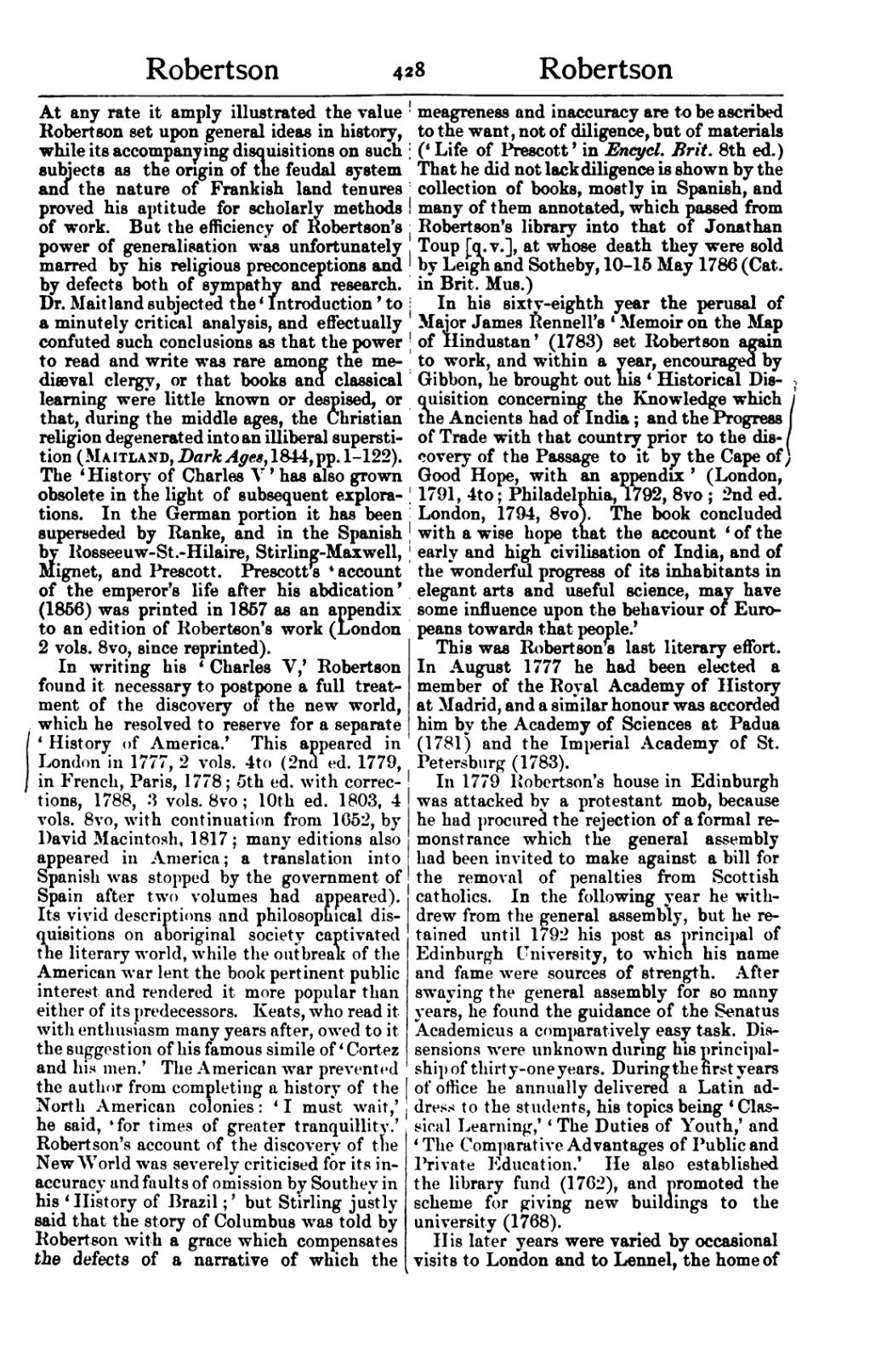At any rate it amply illustrated the value Robertson set upon general ideas in history, while its accompanying disquisitions on such subjects as the origin of the feudal system and the nature of Frankish land tenures proved his aptitude for scholarly methods of work. But the efficiency of Robertson's power of generalisation was unfortunately marred by his religious preconceptions and by defects both of sympathy and research. Dr. Maitland subjected the ‘Introduction’ to a minutely critical analysis, and effectually confuted such conclusions as that the power to read and write was rare among the mediæval clergy, or that books and classical learning were little known or despised, or that, during the middle ages, the Christian religion degenerated into an illiberal superstition (Maitland, Dark Ages, 1844, pp. 1–122). The ‘History of Charles V’ has also grown obsolete in the light of subsequent explorations. In the German portion it has been superseded by Ranke, and in the Spanish by Rosseeuw-St.-Hilaire, Stirling-Maxwell, Mignet, and Prescott. Prescott's ‘account of the emperor's life after his abdication’ (1856) was printed in 1857 as an appendix to an edition of Robertson's work (London 2 vols. 8vo, since reprinted).
In writing his ‘Charles V,’ Robertson found it necessary to postpone a full treatment of the discovery of the new world, which he resolved to reserve for a separate ‘History of America.’ This appeared in London in 1777, 2 vols. 4to (2nd ed. 1779, in French, Paris, 1778; 5th ed. with corrections, 1788, 3 vols. 8vo; 10th ed. 1803, 4 vols. 8vo, with continuation from 1652, by David Macintosh, 1817; many editions also appeared in America; a translation into Spanish was stopped by the government of Spain after two volumes had appeared). Its vivid descriptions and philosophical disquisitions on aboriginal society captivated the literary world, while the outbreak of the American war lent the book pertinent public interest and rendered it more popular than either of its predecessors. Keats, who read it with enthusiasm many years after, owed to it the suggestion of his famous simile of ‘Cortez and his men.’ The American war prevented the author from completing a history of the North American colonies: ‘I must wait,’ he said, ‘for times of greater tranquillity.’ Robertson's account of the discovery of the New World was severely criticised for its inaccuracy and faults of omission by Southey in his ‘History of Brazil;’ but Stirling justly said that the story of Columbus was told by Robertson with a grace which compensates the defects of a narrative of which the meagreness and inaccuracy are to be ascribed to the want, not of diligence, but of materials (‘Life of Prescott’ in Encycl. Brit. 8th ed.). That he did not lack diligence is shown by the collection of books, mostly in Spanish, and many of them annotated, which passed from Robertson's library into that of Jonathan Toup [q. v.], at whose death they were sold by Leigh and Sotheby, 10–15 May 1786 (Cat. in Brit. Mus.).
In his sixty-eighth year the perusal of Major James Rennell's ‘Memoir on the Map of Hindustan’ (1783) set Robertson again to work, and within a year, encouraged by Gibbon, he brought out his ‘Historical Disquisition concerning the Knowledge which the Ancients had of India; and the Progress of Trade with that country prior to the discovery of the Passage to it by the Cape of Good Hope, with an appendix’ (London, 1791, 4to; Philadelphia, 1792, 8vo; 2nd ed. London, 1794, 8vo). The book concluded with a wise hope that the account ‘of the early and high civilisation of India, and of the wonderful progress of its inhabitants in elegant arts and useful science, may have some influence upon the behaviour of Europeans towards that people.’
This was Robertson's last literary effort. In August 1777 he had been elected a member of the Royal Academy of History at Madrid, and a similar honour was accorded him by the Academy of Sciences at Padua (1781) and the Imperial Academy of St. Petersburg (1783).
In 1779 Robertson's house in Edinburgh was attacked by a protestant mob, because he had procured the rejection of a formal remonstrance which the general assembly had been invited to make against a bill for the removal of penalties from Scottish catholics. In the following year he withdrew from the general assembly, but he retained until 1792 his post as principal of Edinburgh University, to which his name and fame were sources of strength. After swaying the general assembly for so many years, he found the guidance of the Senatus Academicus a comparatively easy task. Dissensions were unknown during his principalship of thirty-one years. During the first years of office he annually delivered a Latin address to the students, his topics being ‘Classical Learning,’ ‘The Duties of Youth,’ and ‘The Comparative Advantages of Public and Private Education.’ He also established the library fund (1762), and promoted the scheme for giving new buildings to the university (1768).
His later years were varied by occasional visits to London and to Lennel, the home of
